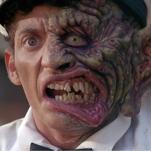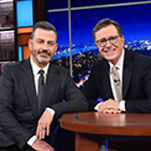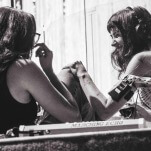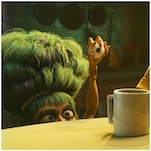Reconsidering Louie—and Myself
Photo: KC Bailey/FX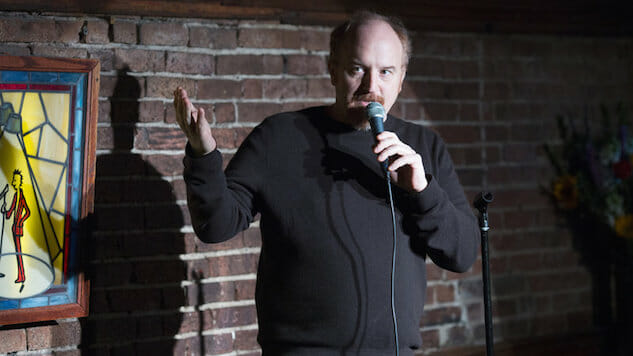
In the aftermath of the New York Times’ report on comedian Louis C.K.’s sexual misconduct, and his subsequent admission that “these stories are true,” I found myself watching Louie again—trying to understand what I saw in it, or more precisely what I missed. In “So Did the Fat Lady,” for instance, Louie’s pursued by Vanessa (Sarah Baker), a lively, funny, self-described fat person, only to brush her off. On its face, the episode is a surprisingly honest treatment of sexual double standards: Despite Vanessa’s persistence, the oafish protagonist directs his attention to a young, thin, uninterested waitress; upon seeing Vanessa, one of Louie’s schlubby pals from the stand-up circuit says, simply, “Yuck.” When Louie relents and agrees to meet Vanessa for coffee, she proceeds to turn the tables, with a monologue received, at the time, as a “thought-provoking” apology to fat girls, a “stunningly blunt” “education” for Louie, a seven-minute set piece to confirm the series’ derring-do. “I’m going to go ahead and say it,” she warns at one point, in the midst of explaining the cognitive dissonance that allows Louie to consider himself out of her league. “It’s your fault.”
It would be satisfying to brandish an essay on “So Did the Fat Lady” more skeptical of its thematic thrust, but I did not write it. (To her credit, Slate’s Willa Paskin did.) It would be comforting to suggest that the “revelations” of the past week—which were not “revelations” at all, but the confirmation of rumors that had circulated for years, and been published by the now-defunct Gawker—cast “So Did the Fat Lady” in new light, though they don’t, not exactly. In point of fact, C.K.’s use of Louie’s performative self-criticism as a shield, deflecting the whisper network’s allegations by leaning into the series’ reputation for frankness, is right there in the episode’s ending. As Vanessa’s scorching appraisal slows, then stops, she confesses, “All I want is to hold hands with a nice guy,” and Louie reaches out to grab hers, gesturing and laughing for emphasis. By the time the closing credits come, with Louie reciting the joke from which the episode takes its title, he is the hero again, the “nice guy” of Vanessa’s description, and the apparent self-criticism emerges as self-justification. This is the ugly through line of Louie, the one I failed to see, or perhaps preferred not to: As it happens, its stories are true, pathological reflections of its creator’s mistreatment of women, and in framing the series as an unflinching fiction, I am culpable in advancing its most insidious lie.
Of the relationship between Louis and Louie, and the relationship among critics, audiences, art and the truth, much has already been written. By Paskin: “Rather then abnegating the series’ acuity, the revelations give it a sickening edge: Louie was a kind of propaganda piece for the decency of Louis C.K.” By The Week’s Lili Loofbourow: “I’m mourning these reports, as a fan, which is beyond embarrassing. It means admitting you were duped, and you’re likely struggling between horror and denial.” By The New Yorker’s Emily Nussbaum: “Here’s one thing that I’m not concerned about right now: the question of what today’s revelations do to the artistic legacy of Louis C.K.” It was in reading their responses, keen insights run through with rightful repulsion, that I began to reconsider not only Louie, but also myself—my own cognitive dissonance, as it were, which allowed me to write, of the series’ fifth season, that “its discomforts are the lion’s share of its charm,” while mentioning (parenthetically) the allegations against C.K., and describing Louie as “a beer-bellied blunderer whose most vulnerable moments are nevertheless run through with the creepy, leering sexual entitlement of the middle-aged man.”
Of course, part of this is a function of Louie’s own defensive posture, its “feminist” feint, holding up questions of gender, sex and power for such close examination that the real shape of the series begins to blur. But part of it, too—the part that implicates critics like me—is the way in which the consensus that emerged around Louie so often substituted the shorthand of the medium’s so-called “golden age” for clear-eyed analysis, and so protected the man of that mincing, half-contrite statement, in which the admiration he felt from the women he abused becomes another justification, another deflection, another shield. Watching it again now, the series’ interest in the more sordid aspects of Louie’s sex life seems so obviously in line with C.K.’s misconduct that my own silence on the subject is impossible to write off as a mere failure of foresight. It would be reassuring to believe that I only admired Louie because the information I needed to “read” it correctly remained in the realm of rumor, but in truth its repellent sexual politics were there in the text all along.
On occasion, Louie repurposes stories similar to those we now know to be true and frames them, rather flagrantly, as comic exaggerations: The series’ second-ever episode, “Poker/Divorce,” features repeated flashbacks to a classmate’s demand that adolescent Louie “whip it out,” and culminates with that classmate, now a middle-aged woman, kissing Louie passionately after he recounts the memory; the second season’s “Come On, God” begins with Louie defending masturbation to a conservative commentator on a cable news panel, witnesses her describe saving herself for marriage in the breathy tones of a phone sex hotline, and concludes with Louie jerking off in her hotel bathroom. On others, the series turns to fantasies so familiar in film and television that it’s easy to become inured to them: In the fourth season’s “Model,” Louie bombs at a benefit in the Hamptons and thus earns the affection of a beautiful, glamorous blonde, who brings him back to her mansion and beds him because he makes her laugh. On still others, more disturbing, Louie seems to suggest that women are “asking for it”: In the pilot episode, a woman exposes herself to Louie, then calls him a “pig” for looking; later in the season, his date admits to being turned off when he fails to fight a teenage bully, leaving unquestioned the canard that women only claim to want the mature, sensitive man, the “nice guy,” when it’s machismo, aggression, they truly desire. And on one occasion, Louie commits assault, manhandling his friend Pamela (Pamela Adlon) as she tries to resist his advances: “This would be rape,” she says, “if you weren’t so stupid.”
One needn’t know that C.K. had already masturbated in front of multiple women by the time Louie debuted in 2010, or that he rationalized his actions as permissible because he “never showed a woman [his] dick without asking first,” to see that the series was always suffused with the “no means yes” thinking by which predators excuse sexual harassment and assault. And yet, even after that unsettling interlude in “Pamela, Part 1,” even after it’s “resolved,” later in the season, by Louie and Pamela’s decision to begin a romantic relationship, even after broaching the notion, in my essay on Season Five, that Louie might be “a defense mechanism, a way of preemptively letting himself off the hook,” I managed to conclude that “the knife’s edge” on which the series seemed to be perched ultimately punctured the privilege of its protagonist, and by extension its creator, rather than protecting it.
What I want to suggest, as a way of answering why—as a way of accounting for what I see now as a particularly shameful dereliction of the critic’s duty, which is to flay open the artwork in question and dig out its innards, to describe its unconscious messages, buried meanings, hidden scripts—is that I lost sight of Louie, the text itself, blinded as I was by the fact that it fit so snugly into the medium’s prevailing meta-narratives. Louie, one of the touchstones of TV’s most recent “golden age,” swiftly became an emblem of the artistic currents that defined it: I myself have cited it, in print or in passing conversation, as an example of the rise of the TV “auteur,” of the evolution from sitcoms to “serious” comedies, of cable networks’ embrace of creative risk; of structural daring, aesthetic ambition, appointment viewing in the age of the binge. Only the most charitable reading of Louie—as sincere self-criticism, not vile self-justification—could sustain this faith that the series said something meritorious about the medium to which I’ve committed my career, and so I left my qualms inside the parentheses, noted but not fully addressed.
As Kevin O’Keeffe, a writer for LGBTQ publication Into, remarked to me on Twitter, the work now is “recognizing and reckoning with the ways in which we all participate in a destructive cycle without ill intent,” and for me, at least, that reckoning must include the fact, flayed open by Louie, that the language we lean on as critics contains its own unconscious messages, buried meanings, hidden scripts. If Louie is C.K.’s self-serving attempt to polish his perversions by airing them on television, as Paskin writes; if the women chased from the business by powerful men’s sexual misconduct represent an incalculable loss to popular art, as Nussbaum and Loofbourow both note; then critics, men especially, must confront the ways in which we added to that polish, and also to that loss. Because the praise that accompanied Louie—the blindness of my own reading—is inextricable from a culture, among both critics and audiences, that defines brooding dramas from male showrunners as “prestigious,” and juicy potboilers from female ones as “guilty pleasures.” That apologizes for Game of Thrones’ obsession with sexual violence by labeling it “realistic,” but prefers to “separate the art from the artist” when the art actually approximates the artist’s real-life transgressions. That positions certain subjects (the meth trade, anti-capitalist hackers) as “important,” and others (female friendship, the lives of gay men) as “niche”; that favors certain genres (the crime drama, the stand-up’s semi-autobiographical comedy) over others (the melodrama, the musical); that codes certain TV series as “masculine” and others as “feminine,” and proceeds to define the former, through prizes and plaudits and even simply attention, as the more worthy of the two.
That this reflects its own double standard—one subtler, even subconscious, in its application—is, I suppose, why “So Did the Fat Lady” left me so disappointed that I failed to see Louie for what it was. The episode’s conclusion, popping the balloon of the fat lady’s fury as surely as the punch line of Louie’s long joke, is no more an apology to women, fat, thin or otherwise, than C.K.’s statement; it is, as if to presage the comedian’s response to the Times’ bombshell reporting, a dissembling, hand-waving, breathtakingly narcissistic pat on the back for feeling a pinprick of remorse. In hindsight, there is no doubt in my mind that those meta-narratives I mentioned shaped the admiration for “So Did the Fat Lady,” and for Louie entire, much as they shaped the equally telling blend of appreciation, opprobrium, and outright hatred that met its more audacious forerunner: “One Man’s Trash,” from the second season of Girls. “So Did the Fat Lady” reminded me that the opposite of my misplaced praise for Louie—some part, however small, of the acclaim under which C.K. took cover from then-rumors of sexual misconduct—might be my frequent scrutiny, sometimes applauding and sometimes panning, of Lena Dunham’s own thought-provoking, stunningly blunt dramedy, which has too rarely been admired as such. What I mean to say is that I am not above reproach when it comes to double standards, destructive cycles, unconscious messages, hidden scripts, and reckoning with these personal shortcomings is at the core of criticism, or should be. If TV’s ever-changing complexion has taught me anything, it’s that nothing is beyond reconsideration—least of all myself.
Matt Brennan is the TV editor of Paste Magazine. He tweets about what he’s watching @thefilmgoer.
